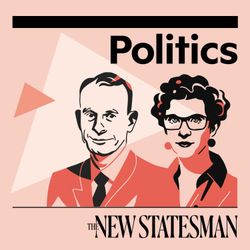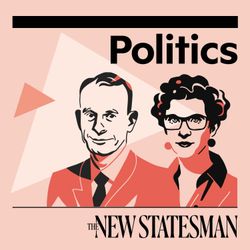Share

The New Statesman | UK politics and culture
Where do we get the money to fix the world's biggest problems? | Sponsored
The world is currently facing multiple crises, from geopolitical conflicts to pandemics and climate change. But amidst this turbulence, international aid budgets are being stretched as domestic issues take precedence. The UK has cut its overseas aid budget significantly, from 0.7 to 0.5 per cent of gross national income. Meanwhile, low-income countries need more support than ever, as they deal with the fall out of wars, extreme poverty, natural disasters and humanitarian issues. The costs involved are huge, and while aid still has a role to play, we need to look beyond grants to unlock funding on a bigger scale to fix these problems.
In this sponsored podcast, host and freelance journalist Emma Haslett is joined by Sarah Champion, Labour MP for Rotherham and chair of the cross-party international development parliamentary committee; James Mwangi, founder of Climate Action Platform for Africa, an organisation working to unlock Africa's potential as a global hub for climate action; and Hannah Ryder, CEO at Development Reimagined, an Africa-led and women-led international development consultancy.
Focusing on the African continent, they explore the need to reform global financial institutions, and how the UK can develop new models of financial support that rely less on aid and more on partnership and collaboration with low-income countries.
This podcast is sponsored by ONE, a not-for-profit international development organisation which campaigns to end extreme poverty and preventable disease by 2030.
Join the fight for a more equal future: visit one.org.
More episodes
View all episodes

The ageing rock gods and me - Kate Mossman on meeting KISS, Bon Jovi, Terence Trent D'arby and more
28:10|"Meet your heroes - it'll help you get over them"Kate Mossman is known for her singular, surprising and ultra-perceptive interviews - in which she often reveals more about her subjects than sometimes they appear to know themselves.And there is one breed of interview subject Kate has written about more than any other: the ageing male rock star.If anyone knows about meeting their heroes, it’s her.In her debut book, Men of a Certain Age, Kate Mossman collects and revisits the interviews she’s conducted with rock royalty such as Kiss, Jon Bon Jovi, Nick Cave, Ray Davies… and her teenage obsession: Roger Taylor of Queen.In this episode of Culture from the New Statesman Kate join Tom Gatti to discuss her obsession with ageing rockers, and shares some behind the scenes stories of her time with rock royalty.BUY KATE'S BOOKMen of a Certain Age is available to pre-order here: https://uk.bookshop.org/p/books/men-of-a-certain-age-my-encounters-with-rock-royalty-kate-mossman/7792527?ean=9781788705646SEE KATE LIVEKate Mossman in discussion with Alexis Petridis, live in Londonhttps://www.eventbrite.co.uk/e/men-of-a-certain-age-kate-mossman-with-alexis-petridis-tickets-1270535970289?aff=ebdssbdestsearch&_gl=1*25lj0d*_up*MQ..*_ga*MTU1MDAwNzE1Ni4xNzQzMTg1MTYz*_ga_TQVES5V6SH*MTc0MzE4NTE2My4xLjAuMTc0MzE4NTE2My4wLjAuMA..READ MORE Kate interviews Jon Bon Jovi: https://www.newstatesman.com/culture/2016/11/jon-bon-jovi-on-trump-bono-bieber-and-the-agony-of-his-split-with-richie-samboraKate meets Terence Trent D'Arby: https://www.newstatesman.com/long-reads/2015/10/i-was-killed-when-i-was-27-curious-afterlife-terence-trent-d-arbyHow Jeff Beck became a guitar hero by saying no: https://www.newstatesman.com/culture/music/2023/01/jeff-beck-interview-tribute-guitar-heroLISTEN AD-FREEGet the New Statesman app:iOS: https://apps.apple.com/gb/app/new-statesman-magazine/id610498525Android: https://play.google.com/store/apps/details?id=com.progressivemediagroup.newstatesman&hl=en_GBSUBSCRIBEJoin the New Statesman from £8.99 per month https://secure.newstatesman.com/offer
Why aren't we getting a wealth tax?
21:51|How would it work? Can a state really find out how rich someone is? If Britain were to introduce serious wealth taxes, would the super rich simply leave?Rachel Cunliffe is joined by the political editor Andrew Marr and business editor Will Dunn to discuss the prospect of a wealth text, and the implications of the Houthi PC small group on Westminster's Whatsapp addiction.Read: Would a wealth tax work?, Westminster’s WhatsApp addiction must endSign up to the New Statesman's daily politics newsletter: Morning Call Submit a question for a future episode: You Ask Us
Unpacking a grim Spring Statement
29:56|Growth has halved, welfare has been cut, and defence is hoovering up more and more. Things are looking, and sounding, pretty grim for the Chancellor - and in yesterday's Spring Statement we learned what the fallout from this harsh economic reality will be.Rachel Cunliffe is joined by the New Statesman's political editor Andrew Marr and economist Ben Zaranko from the Institute for Fiscal Studies.Sign up to the New Statesman's daily politics newsletter: Morning Call Submit a question for a future episode: You Ask Us
Are we living through an overdiagnosis epidemic?
43:51|In today's Spring Statement Labour are having to make cuts - and welfare has been hit hard. Last week the health secretary Wes Streeting said that too many people were being written off work due to overdiagnosis. A statement which received considerable backlash.But what do we really mean by overdiagnosis? And how is it affecting public health?Hannah Barnes is joined by neurologist and author Suzanne O’Sullivan about her increasing fears of overdiagnosis and the impact it can have on both physical and mental health; what she thinks about those comments from Wes Streeting (and the reaction to them); and the relationship between public policy and health.This conversation was recorded in partnership with the Cambridge Literary Festival.If you’d like to register for tickets for the upcoming festival from 23-27 April please follow the link: cambridgeliteraryfestival.com
Why we can't let go of Never Let Me Go
29:22|Kazuo Ishiguro's most popular novel is as relevant today as when it was published 20 years ago.--When it was published in 2005, Kazuo Ishiguro’s novel Never Let Me Go was acclaimed by critics and shortlisted for the Booker Prize. Twenty years on – having been adapted for stage and screen and adopted as a set text for schools – it is Ishiguro’s most read work, and is considered a modern classic.Why does this profoundly settling book continue to absorb us? And what does it tell us about the role novels play in helping us grapple with the ethical dilemmas created by advances in science and technology?The critic David Sexton has been re-reading Never Let Me Go and joins Tom Gatti on the Culture from the New Statesman to discuss the impact of Ishiguro's most popular work.RECOMMENDED NEXT EPISODE: Winner of the 2025 Booker Prize, Samantha Harvey, on her novel Orbital - and how "political choices are sculpting the surface of the earth"https://www.newstatesman.com/podcasts/culture-podcast/2024/11/booker-prize-winner-samantha-harvey-political-choices-are-sculpting-the-surface-of-the-earthREADDavid's essay: Kazuo Ishiguro's everyday dystopiahttps://www.newstatesman.com/culture/books/book-of-the-day/2025/03/kazuo-ishiguro-never-let-me-go-everyday-dystopiaGO AD-FREESubscribers can listen to all episodes ad-free in the New Statesman app: iOS: https://apps.apple.com/gb/app/new-statesman-magazine/id610498525Android: https://play.google.com/store/apps/details?id=com.progressivemediagroup.newstatesman&hl=en_GB&gl=US&pli=1SIGN UP FOR OUR NEWSLETTERGet the best of our reporting direct to your inbox every weekend with The Saturday Read.Sign up at saturdayread.substack.comBECOME A SUBSCRIBERFull access from £8.99 per month: https://secure.newstatesman.com/offer
Why can't the left be mobilised?
15:55|Are Labour on track for their target of 1.5million homes? What is NHS England? Why can't the Green's electrify the left in the same way that Reform has done for the right? What will the consequences be of cutting international aid?Hannah Barnes answers listener questions with the New Statesman's political editor, Andrew Marr, and associate political editor, Rachel Cunliffe.Read: Labour’s housing slumpSign up to the New Statesman's daily politics newsletter: Morning Call Submit a question for a future episode: You Ask Us
Is Boris Johnson ... back?
28:26|The prospect of peace in Ukraine, Liz Kendall's welfare cut announcements, and while Kemi Badenoch flails as Conservative leader ... who's waiting around the corner for her job?Hannah Barnes is joined by Andrew Marr and Rachel Cunliffe to discuss this week in Westminster and beyond.Read: A Labour welfare revolt is still brewing, Diane Abbott rails against Keir Starmer, What went wrong for Kemi Badenoch?, Who could succeed Kemi Badenoch?Sign up to the New Statesman's daily politics newsletter: Morning Call Submit a question for a future episode: You Ask Us
Nato’s fragile future
31:46|Since Nato’s inception in 1949, the US has always formed a central part of the alliance and been the biggest contributor to its defensive strength.However, since his second term began, President Donald Trump has shifted the US’s allegiances towards Vladimir Putin’s Russia and away from Nato. Simultaneously, the US President has repeatedly criticised Europe’s defence spending and the continent’s reliance on the US.This radical shift from the Nato status quo has brought the alliance’s future into question.Katie Stallard is joined by David Reynolds and Max Bergmann.
How The Beatles' love story shaped the 20th Century
43:10|A fateful meeting at a village fête "tilted" the 20th Century "on its axis"So argues Ian Leslie in his new book, John and Paul: A Love Story in Songs.In the book, Leslie argues that The Beatles didn't just dominate pop culture - they redefined how we see ourselves.He reframes the relationship between John Lennon and Paul McCartney as a kind of love story, which shaped the second half of the 20th Century and continues to influence us today.Leslie joins Kate Mossman on Culture from the New Statesman to discuss the book, The Beatles and their legacy.John & Paul: A Love Story in Songs is available from March 27 in book shops and online. Pre-order it here*The author Deborah Levy has reviewed the book for New Statesman. Her review is available to read online now, and will appear in the March 20 issue of the New Statesman magazine.Get full access to all the New Statesman's cultural reviews - as well as our leading politics and global affairs reporting - by becoming a subscriber from just £8.99 per month. Visit www.newstatesman.com/offer.Get the best of the New Statesman direct to your inbox every weekend for FREE by signing up to our newsletter, The Saturday Read. Visit saturdayread.substack.com.*Purchasing a book may earn the New Statesman a commission from Bookshop.org, who support independent bookshops.